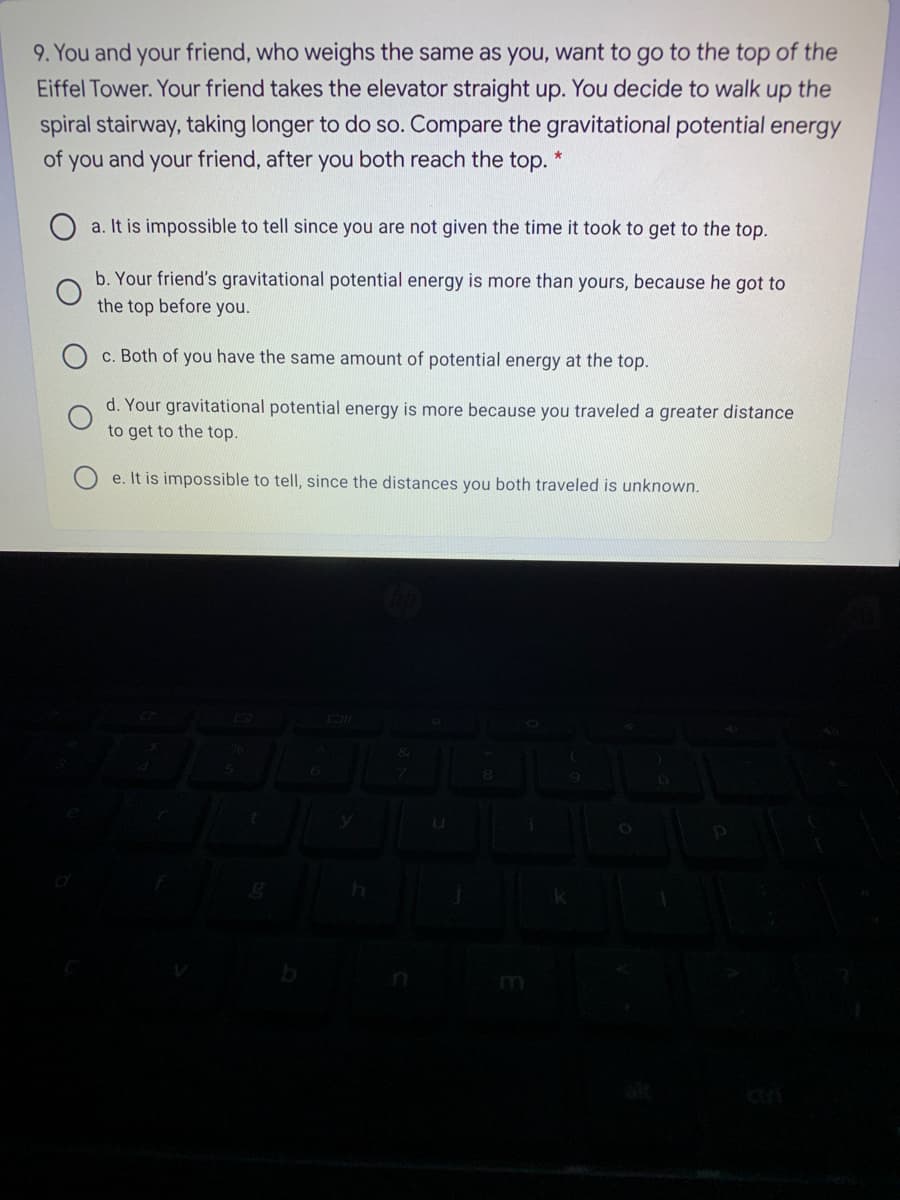9. You and your friend, who weighs the same as you, want to go to the top of the Eiffel Tower. Your friend takes the elevator straight up. You decide to walk dn. the spiral stairway, taking longer to do so. Compare the gravitational potential energy of you and your friend, after you both reach the top. O a. It is impossible to tell since you are not given the time it took to get to the top. b. Your friend's gravitational potential energy is more than yours, because he got to the top before you. c. Both of you have the same amount of potential energy at the top. d. Your gravitational potential energy is more because you traveled a greater distance to get to the top. e. It is impossible to tell, since the distances you both traveled is unknown.
9. You and your friend, who weighs the same as you, want to go to the top of the Eiffel Tower. Your friend takes the elevator straight up. You decide to walk dn. the spiral stairway, taking longer to do so. Compare the gravitational potential energy of you and your friend, after you both reach the top. O a. It is impossible to tell since you are not given the time it took to get to the top. b. Your friend's gravitational potential energy is more than yours, because he got to the top before you. c. Both of you have the same amount of potential energy at the top. d. Your gravitational potential energy is more because you traveled a greater distance to get to the top. e. It is impossible to tell, since the distances you both traveled is unknown.
Physics for Scientists and Engineers: Foundations and Connections
1st Edition
ISBN:9781133939146
Author:Katz, Debora M.
Publisher:Katz, Debora M.
Chapter8: Conservation Of Energy
Section: Chapter Questions
Problem 67PQ: The Earths perihelion distance (closest approach to the Sun) is rp = 1.48 1011 m, and its aphelion...
Related questions
Question
Answer to this question please

Transcribed Image Text:9. You and your friend, who weighs the same as you, want to go to the top of the
Eiffel Tower. Your friend takes the elevator straight up. You decide to walk up the
spiral stairway, taking longer to do so. Compare the gravitational potential energy
of you and your friend, after you both reach the top.
a. It is impossible to tell since you are not given the time it took to get to the top.
b. Your friend's gravitational potential energy is more than yours, because he got to
the top before you.
c. Both of you have the same amount of potential energy at the top.
d. Your gravitational potential energy is more because you traveled a greater distance
to get to the top.
e. It is impossible to tell, since the distances you both traveled is unknown.
DI
Expert Solution
This question has been solved!
Explore an expertly crafted, step-by-step solution for a thorough understanding of key concepts.
This is a popular solution!
Trending now
This is a popular solution!
Step by step
Solved in 2 steps

Knowledge Booster
Learn more about
Need a deep-dive on the concept behind this application? Look no further. Learn more about this topic, physics and related others by exploring similar questions and additional content below.Recommended textbooks for you

Physics for Scientists and Engineers: Foundations…
Physics
ISBN:
9781133939146
Author:
Katz, Debora M.
Publisher:
Cengage Learning

Physics for Scientists and Engineers, Technology …
Physics
ISBN:
9781305116399
Author:
Raymond A. Serway, John W. Jewett
Publisher:
Cengage Learning

Physics for Scientists and Engineers with Modern …
Physics
ISBN:
9781337553292
Author:
Raymond A. Serway, John W. Jewett
Publisher:
Cengage Learning

Physics for Scientists and Engineers: Foundations…
Physics
ISBN:
9781133939146
Author:
Katz, Debora M.
Publisher:
Cengage Learning

Physics for Scientists and Engineers, Technology …
Physics
ISBN:
9781305116399
Author:
Raymond A. Serway, John W. Jewett
Publisher:
Cengage Learning

Physics for Scientists and Engineers with Modern …
Physics
ISBN:
9781337553292
Author:
Raymond A. Serway, John W. Jewett
Publisher:
Cengage Learning

Physics for Scientists and Engineers
Physics
ISBN:
9781337553278
Author:
Raymond A. Serway, John W. Jewett
Publisher:
Cengage Learning

College Physics
Physics
ISBN:
9781285737027
Author:
Raymond A. Serway, Chris Vuille
Publisher:
Cengage Learning

Principles of Physics: A Calculus-Based Text
Physics
ISBN:
9781133104261
Author:
Raymond A. Serway, John W. Jewett
Publisher:
Cengage Learning